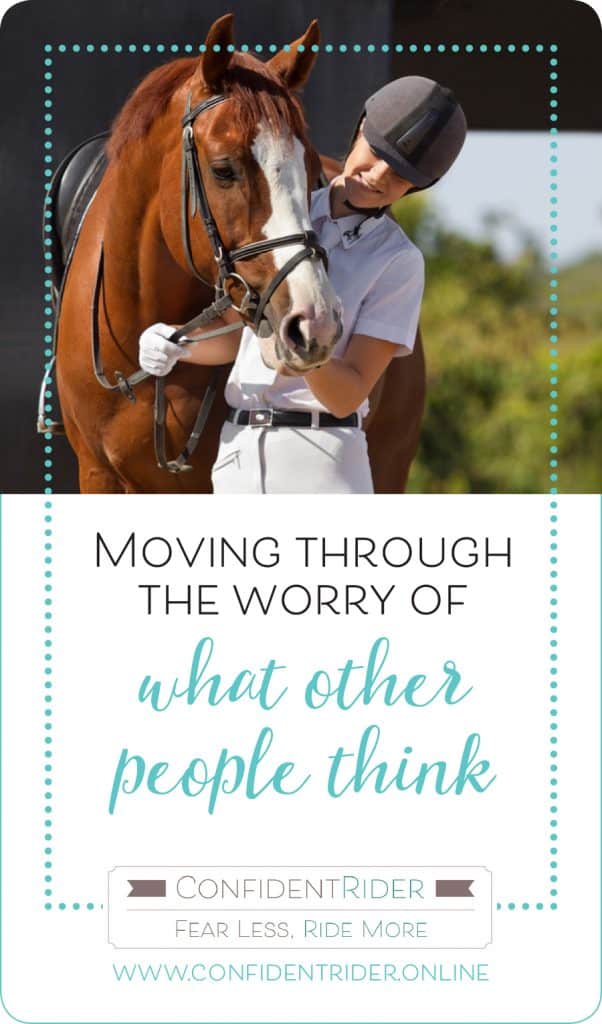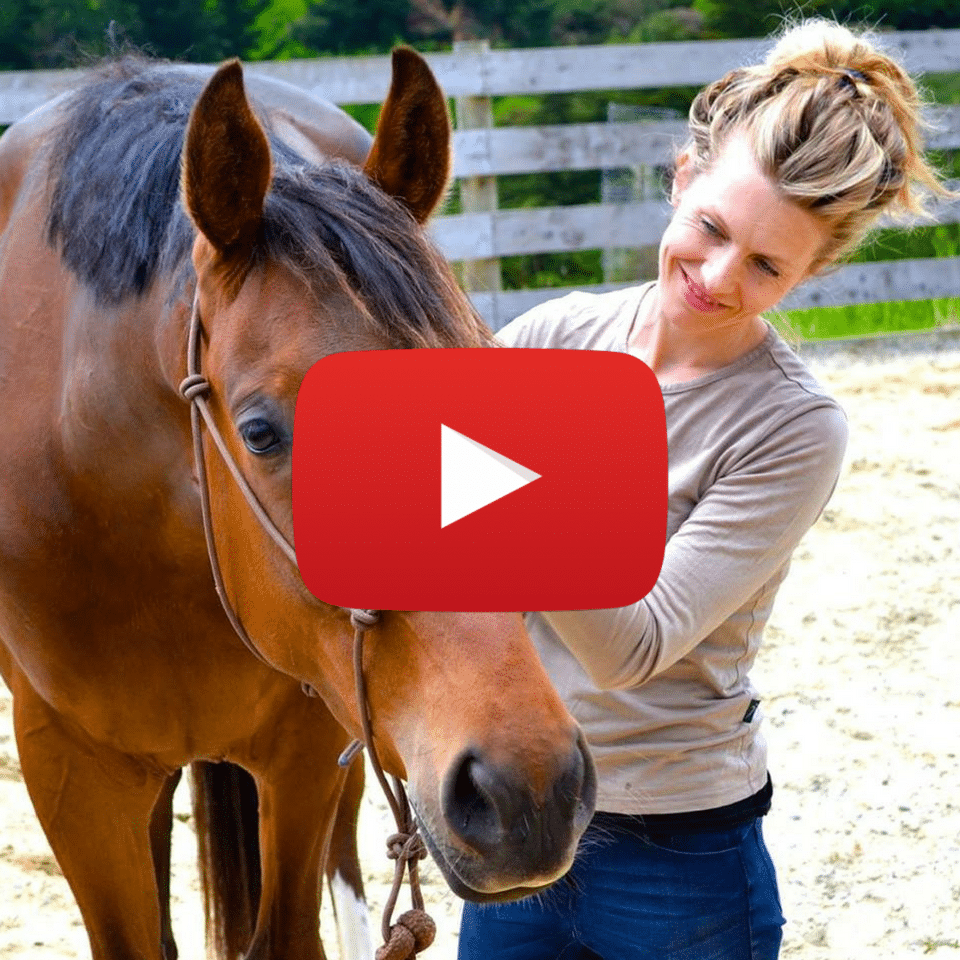Category: Beliefs
Gaining the Mental Edge
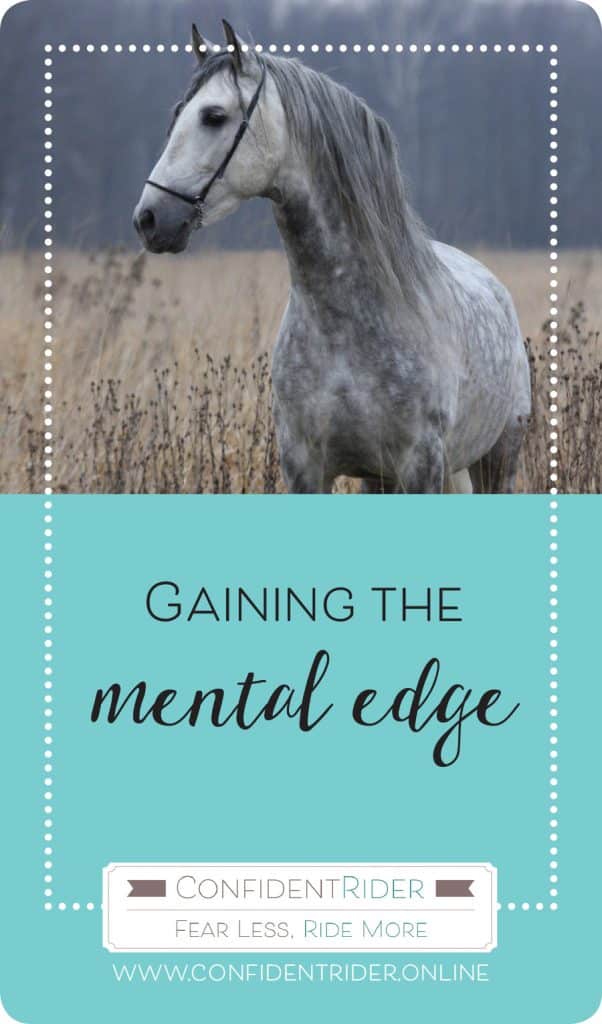
In last week’s blog, I mentioned a five-step process that I work to when training equestrian athletes for competition. The first of these involves developing your “Competition Mindset”, something that is often overlooked when designing and implementing a plan both in the lead up to and on the day of competition.
Creating and optimizing your competitive mindset is so much more than having a “good attitude”. It’s about creating an internal world that fortifies you against outside pressure and distraction and allows you to ride to the best of your ability on any given day. Essentially, it allows you to harness everything that is within your control and leave the rest.
Many studies have shown that if you take a group of athletes with the same level of ability and give only half of them mental skills training, those who received the training will consistently outperform those who haven’t. This proves to us that being able to create the results and outcomes that we want is not just about “working hard”. Time in the saddle is obviously an essential criterion, but making sure you are in the right headspace to really make things happen is crucial.
Creating your competition mindset involves creating an internal space where you can go to mentally prepare yourself and gain the mental edge; it’s about aligning all the components of your inner world- your beliefs systems, your self talk and self-identity- and seeing how they all contribute to creating your external reality.
The foundation stone of your mindset is your belief systems. What a rider believes, what he thinks is possible or impossible to a great extent does actually determine the outcome.
Why is this so? From a biochemical and neurological perspective, when you don’t believe in something, you are sending your nervous system consistent messages that limit or eliminate your ability to produce a result. It’s the glass ceiling effect- you have essentially create a boundary or limitation of what it is the you believe to be possible for yourself, and as a consequence, your mind accepts the limitations and no longer searches for ways break through those boundaries.
When we repeat or reinforce a belief consistently, we give them a sense of permanence that breeds breeds pessimism, procrastination and inaction. Think of yourself when you are in this state. Are you likely to take the necessary action to move you closer towards the situation that you want? When you are feeling pessimistic or like you “don’t have what it takes” are you more likely to look for “ways out” that stop you achieving your goals, or do you create the types of emotional state that will keep you moving forward in times of adversity?
The key to producing the kind of results that you desire is to represent things to yourself in such a way that puts you in such a resourceful state that you are empowered to take the types of quality actions that will create your desired outcomes.
How are your beliefs affecting your outcomes? Do you feel as though your competition mindset could do with a bit of a polish?
xx Jan
Managing Your State in Competition
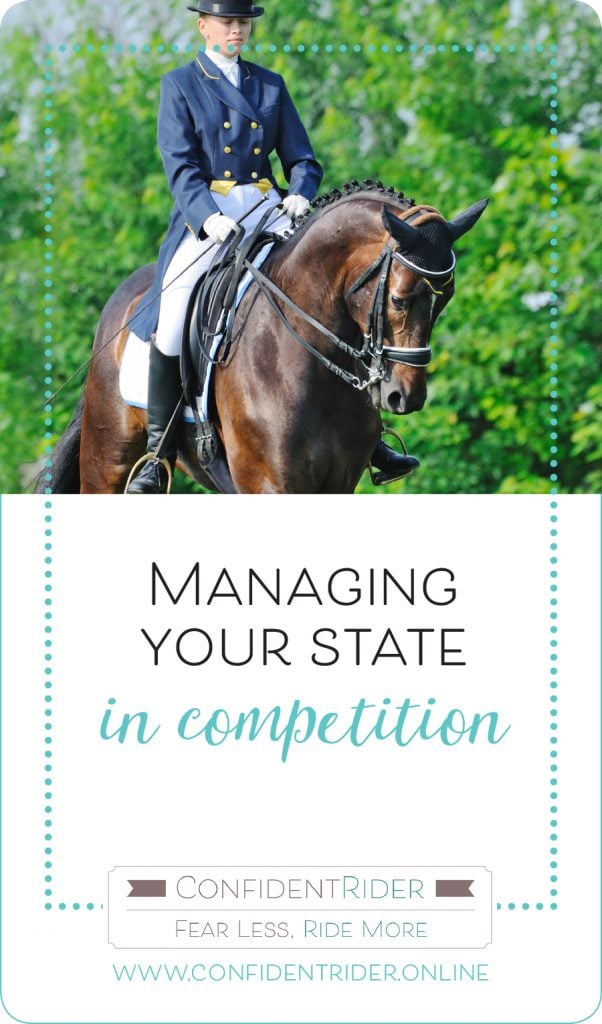
When it comes to competing, or performing in high-pressure situations, being able to manage your emotional state is critical. In sport, the arousal state refers to the ability to manage your heart rate within a certain range- a range that ensures that we are performing both mentally and physically at our best. Obviously, the variability of this range changes depending on the sport in question, but what we do know is that we are always looking to keep our heart rate below 120 beats per minute.
I understand if this all seems a little specific (and possibly even a little boring if you aren’t into the nitty gritty of it all #geekalert) but whilst we may not be able to measure in the moment exactly what our heart rate is (or even want to for that matter), what we can all almost certainly appreciate is the result. Leaving our optimal zone has consequences on our brain function which yields some common signs and symptoms; loss of focus, clarity and the ability to make clear and rational decision to name a few! Not ideal when we are out there in the ring!
Whilst few of us are gifted with the kind of control that allows us to control our heart rate, what we do have control over is our breath. Your ability to control and regulate your breath then becomes your super power in exerting control over both your heart rate (the respiratory and cardiovascular system are intimately connected) as well as brain wave activity. It’s the most tangible tool that we have to manage our physiology and our emotions to ensure that we are in the optimal zone for training and competing.
One of my favourite breath techniques fit for purpose is the 1:2 breath ratio. It’s very simple to practice. Breathing to this ratio mean that if you means that if you have an inhalation of 4 counts, you want your exhalation to be 8 counts. If you have an inhalation of 6 counts, you want your exhalation to be 12 counts. You are doubling the length of your exhalation comparative to your inhalation.
This is a really easy, invisible and highly effective tool that you can use at any stage. You could use it when you are waiting for your turn in the competition arena, you could use it if you feel like you are getting a little disheveled and off centre in training; at any point that you feel as though your thought processes are getting a little “out of hand” in relationship with what you would like them to be, bring in this 1:2 count breath ratio and I guarantee you that you will start to turn things around.
xx Jane
Creating The Future In Advance
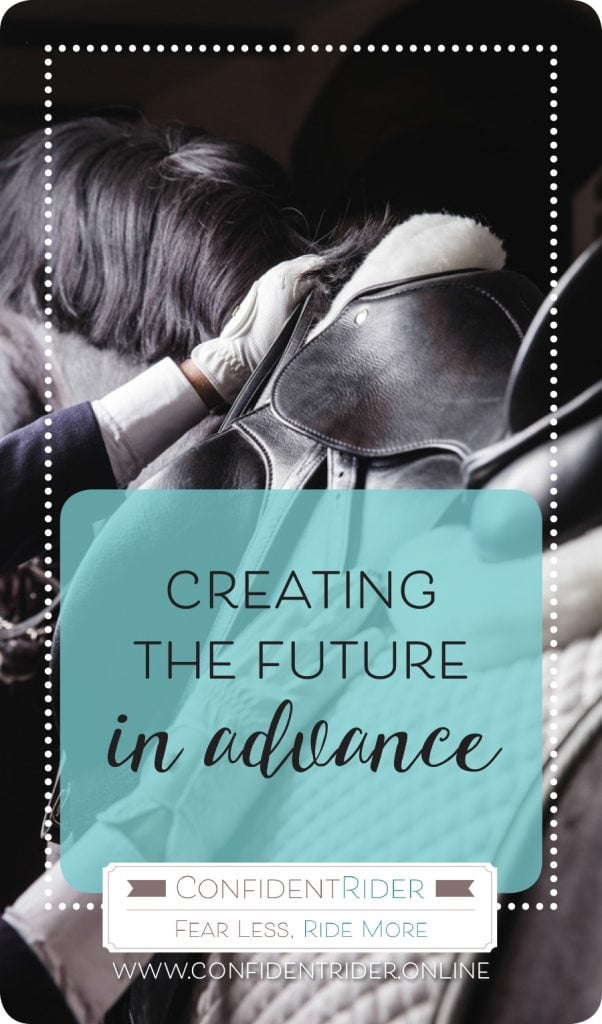
When I started writing this blog yesterday, I was being all very adult about it. I wrote down some stats about the positive effects that visualisation has shown to have in a variety of scientific studies exploring athletic performance, and put forward some compelling arguments as to why you should include as a visualisation practice as a non-negotiable part of your “training workout”. I presented a pretty tight case if I do say so myself.
The thing is, when I read it back, it all seemed a little bit… dry. Boring even. And so I gave myself a stern talking to and deleted the whole lot. You know why? Because visualisation is so far from boring. It’s the polar opposite of boring. It’s like lets-bust-out-an-improvisational dance exciting.
Visualisation is, in fact, your creative super power. It’s useful (nigh on essential) for not only creating our most dreamed about future outcomes but for releasing the shackles of negative or substandard performances that we may have experienced in the past. That’s why when it comes to creating a mental fitness plan for both myself and for other rider, it’s an essential tier that I never, ever overlook. Visualisation, or imagineering is the process of creating the future in advance and showing our minds how it is that we want things to go. And I certainly didn’t want the gods of visualisation to release a thunder clap on my head for presenting it any other way.
Visualisation is your most powerful ally, and the reason for this is that is has a direct affect on the subconscious mind. Whilst on a conscious level we are able to discern between the real and the illusory, your subconscious mind is unable to make this distinction. Quite simply, it cannot tell the difference between something that has occurred in ‘real life’ and something that is vividly imagined.
Creating or envisaging a scene or movie in your mind, with great clarity and detail, creates a magnetic pull; it quite literally reorganizes your mental software. If you imagine or visualize something often enough and with enough feeling and detail, your subconscious mind comes to accept it as a given- it becomes so familiar to you that both psychologically and physiologically you feel as though this is the norm for you, that you have been in this position, living out this scene as you see it in your minds eye many times before. Then the decisions that you make, the actions that you take all work together to set you in alignment with this subconscious target, with this image that you have imprinted on your brain. It’s essential to creating a targeted and specified training routine to optimize your emotional and physical state for competition.
If you are on the fence about its efficacy, think of it this way. If you are faced with a challenge that you know you have the skillset or the competency to deal with effectively, and yet still feel unable to do so, the only barrier that exists that impedes your ability to follow through is in your head. The place to deal with it then is in your head also. Everyone situation that we think about we create a mental movie for, whether we are aware of it or not. Creative visualisation is simply harnessing the power that we are utilizing unconsciously in every moment and using it to our advantage.
See things as you want them to be. Focus on the outcomes you want to create.
Over and out!
xx Jane
Making It Count When It Counts
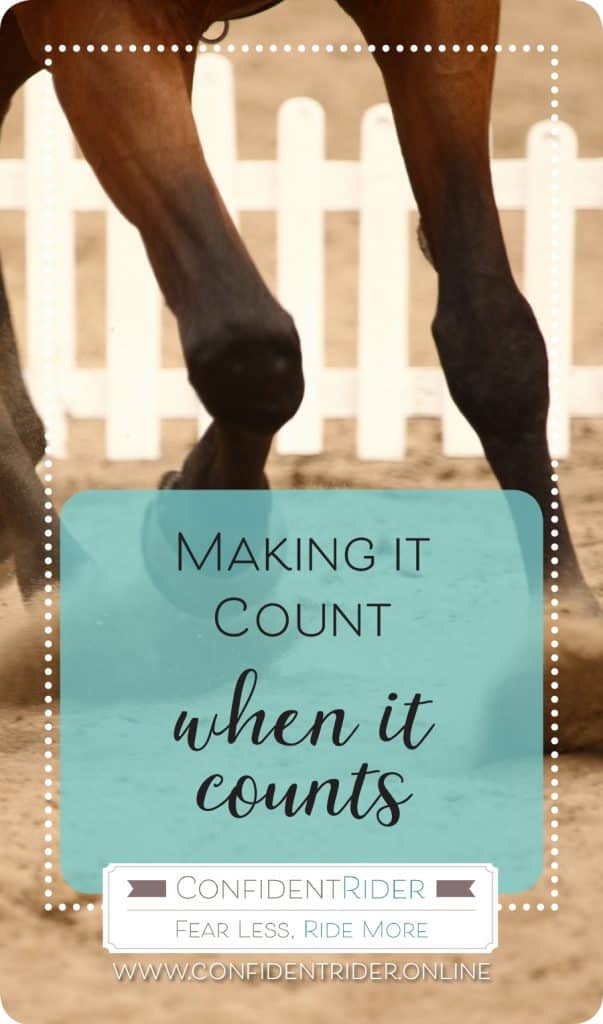
It’s funny how you can really, really love something that makes you feel at the same time like you might actually be sick. I think there are very few things in the world where I could safely pair those two qualities together with confidence. Love and an intense feeling of nausea. But when it came to riding in competition that is most definitely how I used to feel. I loved it, but the enjoyment was always something that came later, once the plaits had been taken out and my horse was peacefully munching his hay by the side of the truck. It was then, when I finally took a breath out, peeled off my jacket and plucked out the two million bobby pins that were required to keep my mountain of hair in some form of control under my helmet that I allowed myself to unravel. This usually happened at the same time as I was eating some sort of toxic looking sausage from the nearest food van, but details details. Enjoyment at competitions for me was like a mist; it was all around me but I couldn’t never quite grab hold of it.
It’s not that I didn’t experience success, or that I felt like I didn’t have what it took to make it happen. I did. I really did. I believed in my horse, I worked hard, put in the training, got the lessons. There was really no viable reason for me to feel so nervous- but that didn’t stop the fact that I did.
As I competed from an early age, I had a lot of time to think about this. And to notice the effect, not only on my enjoyment, but also on my ability to ride the way that I knew I was capable of. How could it be, I asked myself, that I could ride a test in the morning and a similar test on the same horse in the afternoon and experience a completely different result? What had changed (aside from the fact that I have possibly eaten another sausage) between those two periods? It most certainly wasn’t my skill level. And it wasn’t the ability of my horse. It finally dawned on me that the only thing that had changed from the test that I rode at 9.30 am and the test that I rode at 3 pm was my mindset.
Do a little experiment with yourself now. Think back to a time in your riding or in your competitive life where you were really on the money; a time when you were out there, wishing it was the Olympic qualifier you are so dang hot right now. Got that? Awesome.
Ok, now sorry to do this to you, but I want you to have a quick think about a time when things were perhaps not so hot. Perhaps you were feeling like nothing was going to plan, like your left leg may actually be detached from the central functioning unit of your brain because it was basically doing its own thing and as you rode down the centre line, or jumped the jump or rode the pattern, it was like you were doing so blindfolded, with something in your ear. I might have got a bit enthusiastic there but you get the picture.
These experiences can happen days or even hours apart, within spaces of time where the difference in the result that you are able to produce has nothing to do with your level of competency or your skill set as a rider and has everything to do with the mental and emotional framework that you are operating from. Your skill level hasn’t changed, it’s just that the outcome of that particular ride is compromised because your reactions will be dictated in the wrong emotional language for what is required; things will act and behave differently coming out of you and as a result, everything changes. You are not in a state where you were able to access the answers and produce the results that are required for the environment you were riding in.
Once I understood this- like really understood this- it was like hitting the jackpot. I knew that as long as I continued to put the hard yards in physically, if I continued to ignore the fact that my mental fitness was in fact the biggest impediment to my success, I was never going to get very far. In fact, I was going to be going round in circles.
The fact is if you are experiencing results that don’t reflect what you know yourself to be capable of- and it might even be that they are really good results but you know you can do better- then what needs to change is your mind. You need to take your mental training as seriously as you do your physical training.
Building the muscles of your mind works in precisely the same way you build the muscles of your body; with use and with practice. You wouldn’t rock up to compete at a 10km running race having only ever gone for a quick jog the night before. Or if you did, you would know your chances of producing a stellar result would be compromised. Yet this is the exact thing many of us do time and time again at competition. We know we feel a certain way competing. We experience it time and time again, and yet we continue to just hope things will magically get better. It’s bonkers.
In order to create a change in your experience, the first thing that has to change is you. Investing in your mental strength and developing focus, fortitude and mental power will infinitely accelerate your progress and ensure that you can consistently produce the results you are capable of. You will be in control of your state, and as a result, you can ask the right questions of yourself under pressure to produce the answers that you want on the day.
The beauty is the confidence, optimism, focus, fortitude- these are all skills, skills that can be easily learned with a little bit of dedication and practice. And the learning always starts with the decision to no longer tolerate the challenges that you are experiencing that you know are holding you back. In their place, we are then free to embrace new behaviors and rituals that will allow us to continually manage our mental and emotional framework and as a consequence showcase the skills of both our horses and ourselves when it matters to us most.
xx Jane
Lacking Motivation to Ride

Alex says:
I have no motivation! I still want to ride and think to myself every day “I am going to ride today and we are going to work on something specific”, and then when it comes down to it, my attitude changes to, “maybe tomorrow… it looks like it might rain… I have a headache coming on…” So many excuses! Is there anything I can do?
Hi Alex,
Thank you so much for your question. I know that a lack of consistent motivation is something that many riders struggle with. The reasons behind why this is the case is usually individually specific, and can also trace back to past experiences or negative beliefs and associations.
In this blog, however, I am going to keep it really practical and outline a few “likely culprits” for you in the hope that you will identify with one or a few of them and be able to create a much more inspired path forward!
1. Reconnect with your purpose
Lack of motivation can arise when we become disconnected from our purpose, when we have lost sight of why we are doing what we are doing in the first place. When we are divorced from our “why”, it is much harder to create the “what”, and we need both in order to create an effective, solid and uplifting strategy for the future.
Start first with your why; why do you ride? Why do you have horses? Why is it that you do what you do?
Reconnecting with why you ride in the first place will also give you something tangible to compare your current riding experiences against. For example, if you ride for the pure joy of it, but at the moment you aren’t having much fun at all, you are denying one of the basic values that motivated you to ride in the first place. If this is the case, all is not lost; quite the opposite! Instead, you now know what you need to adjust and alter in order to ensure that those core values or intrinsic drivers are present in your riding activities and relationships.
2. Keep it simple
In order to create momentum and ensure that you are aren’t feeling discouraged or overwhelmed at the thought of riding before you even get there, I would work to ensure that you have a really clear outcome for your ride that was achievable for you and your horse. You can stretch yourself if you feel the need, but for the moment concentrate of creating markers for yourself that are tangible and achievable targets. Essentially, set yourself up for success! The more “good” rides you have, the better you are going to feel about your riding experiences and capabilities. I’m not suggesting that you don’t aim higher in the future, but for the moment make your aim to create momentum; having enjoyable rides with successful outcomes is the best way to make that happen!
3. Have a talk to your future self
Usually, when we make a decision and create a strategy for the future of our riding, we do so from a very reasoned and intelligent position. We have looked at the facts, understand what is needed and are committed to following through with what is required. If we find, however, that the moment we step outside are are failing to put that plan in action, then we are allowing our current mood to override what it is that we ultimately want, and it is in this moment, in this moment of decision that our greatest power lies.
If you go outside to ride and you find you are talking yourself out of it, assess whether this is something that your future self if going to want and be proud of. We have made a decision to get out there and ride based on our dreams and aspirations, and we have an idea of what we want our future selves to look like or be capable of.
If in the moment you decide, uggh, I know, I know I should ride my horse but I really don’t feel like it, take stock of the moment and think intelligently. Think about what it was in the past that led you to decide that you need to ride in this moment and what that is going to create for you. Connect to something bigger than the present moment. Refuse to allow your mood to cast the ruling vote in a situation that ultimately you know you are going to regret later.
4. Make yourself accountable
Create a situation where you make a commitment to someone outside of yourself, and then arrange to report back to them once you have followed through. In many instances, it becomes easy for us to become a bit faffy because there is not immediate consequence to our actions; so no one will really see whether we ride or not, and maybe we even keep it to ourselves just in case we don’t actually ride when we say we will. Enough of that! It’s not about becoming militaristic, but it is about setting an intention and then developing the consistency of action that allows us to follow through. Tell someone your plans and then let them know once you’ve done it!
Let me know how you get on!
xx Jane
The Magic of Focus
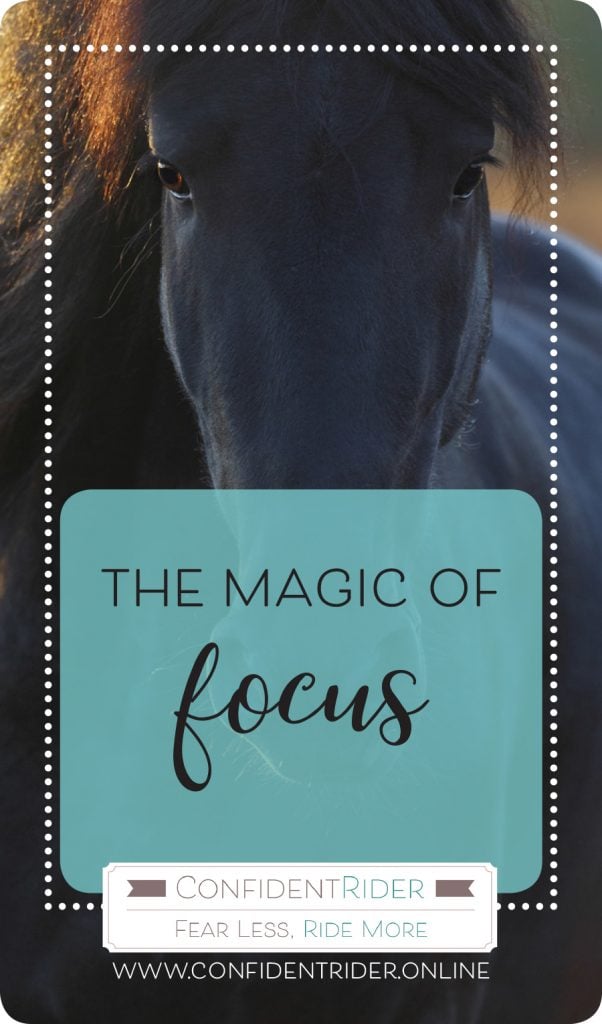
Your focus determines your reality.
It might sound simplistic, but it’s true. The basis of it is this: whatever you choose to focus on you give meaning too, and as soon as you assign meaning you assign power. Experience only becomes positive or negative once you assign meaning, and the meaning that you assign is a direct result of your focus. Meaning either lifts you up and drives you forward, or brings you down.
The real skill then, lies in your ability to continually control and direct your focus and to put every situation and event into an empowering context.
Let’s get down to the nitty gritty. If you are choosing on a regular basis to focus on what isn’t working in your riding or your life, then more of what isn’t working is going to appear. Why? One of the universal habits that we have as human beings is that we are creatures of deletion. Our unconscious mind is capable of processing so much information from our environment (it’s something crazy like 3 million pieces of information per second), that it would quite simple send us loopy if it all filtered through to our conscious awareness (which conversely can only manage 6 or 7).
As a consequence, we pick out only a handful of things to bring to the forefront of our minds, and what we pick out is based on two primary components; our focus and our underlying belief systems about who we are and what we are capable of. If we choose to direct our focus on all the areas of our riding where we feel lack, displeasure or discomfort, then all of the existing forces that would ordinarily naturally oppose this- ie the areas where things ARE working- seem to magically disappear. That don’t support the framework that we are choosing to operate under and as a result we delete them from our conscious awareness altogether.
That’s the power of focus.
Let’s talk about some ways that you can apply the Super Power that is Focus to your benefit and not to your demise!
1. Focus on what it is that you want
Most riders that I work with are exceptionally gifted at articulating what it is that they don’t want and not so good at clarifying what it actually is that they do want. As a rule of thumb, think of constantly directing yourself towards that which you are looking to create or manifest, rather than moving away from something that you are wanting to avoid.
For example, if I was to ask you what it is that you are wanting from your horse at the upcoming competition, and your answer was that you didn’t want him to be tense or anxious, you have already formed a negative focus. What you are actually wanting is for him to be calm and relaxed. How you choose to phrase what you desire will determine your focus as well as the associated images that play over in your mind when you think about the event.
Move towards something rather than away. Focus on what it is you want.
2. Focus on what’s happening right now
If you want to harness a super power, harness the power of being in the moment. If you focus is too much in the past, or projecting into the future, you can’t be offering forward the best version of yourself in the current moment.
Set your goals and work towards them with determination and dedication, but as soon as your bum hits the saddle, deal with what’s in front of you. Be the rider that your horse requires you to be from moment to moment, and focus on responding to their needs with leadership and compassion.
You can’t be two places at once. You can’t be here and there at the same time.
Always focus on the next right move for you and your horse.
3. Train yourself to focus on the positive
This doesn’t mean becoming Mary Poppins (although, frankly, she had a lot of good things to say!). Positivity is not a fixed state, but rather continuous positive action. It’s the ability to draw on the resourcefulness that you have inside of you and the means to continually ask yourself empowering questions.
What do I need to do in this moment to move forward in the best manner possible?
How do I need to behave in this situation?
What resources can I draw on that will help me progress from where I am now to where I want to be?
Positivity. Self-belief married with consistent positive action.
Getting in The Zone for Competition
[et_pb_section bb_built=”1″ admin_label=”section”][et_pb_row][et_pb_column type=”1_2″][et_pb_image _builder_version=”3.0.71″ src=”https://confidentrider.online/wp-content/uploads/2017/03/JoyRide-Pinterest-Pins-24.jpg” show_in_lightbox=”off” url_new_window=”off” use_overlay=”off” sticky=”off” align=”left” always_center_on_mobile=”on” border_style=”solid” force_fullwidth=”off” /][/et_pb_column][et_pb_column type=”1_2″][et_pb_text _builder_version=”3.0.71″ background_layout=”light” text_orientation=”left” text_font_size=”19″ text_line_height=”1.8em” border_style=”solid”]
I went to a competition last weekend, and it takes me a good 20 minutes or so before I really get it together. I get completely thrown off course by everything around me- people warming up, looking at other coaches and riders on the sidelines watching me ride. How can get my head in the right space so I can produce the results in competition that I am experiencing at home?
[/et_pb_text][/et_pb_column][/et_pb_row][et_pb_row admin_label=”row” background_position=”top_left” background_repeat=”repeat” background_size=”initial”][et_pb_column type=”4_4″][et_pb_text background_layout=”light” text_orientation=”left” text_font_size=”19″ text_line_height=”1.8em” border_style=”solid” background_position=”top_left” background_repeat=”repeat” background_size=”initial” _builder_version=”3.0.71″]
Start by thinking of every emotion that we experience as a form of energy. Getting in the zone, or getting our head in the right space, involves concentrating all of the energy that is available to us at that particular moment and directing it towards our ultimate outcome. When we do so effectively, it gifts us with the ability to ride with focus and clarity and the means to continue to make effective decisions in the face of outside pressure.
Everything that you have going on inside your head has everything to do with how well you end up performing.
When you arrive at a competition, the emotions, pressures and distractions of your environment becomes interspersed with what it is that is going on inside your head. We begin to mix the energy of the outside with the energy of the inside, and the potential result of those two forces combining can form any number of possible results. Depending on your mental skill base, what manifests on the outside could be feelings of nervousness, anxiety and loss of focus- or it could be confidence and clarity. It all comes down to the ability to consistently direct your focus in a way that empowers you and have the mental strength and skills that will enable you to harness the energy and use it to your advantage.
This is what riders and athletes who perform at the highest level know how to do. They recognize the forces that will be outside of their control and influence but have developed the mental fortitude that allows them to continue to perform at their optimum in the face of it. Across the board, it is those riders who learn and practice mental training techniques along with the physical training techniques that are consistently able to produce the highest level of results.
So how is this possible? How do you develop that kind of mental strength for yourself? With my private clients, I work to a 5 step program that embodies the following elements:
1. Developing your competition mindset. This encompasses several elements that involves analysing your underlying belief systems, self talk and aspects of self identity which feed in to your ability to create the results you desire.
2. Breath work that ensures you can effectively manage your emotional and physical responses to stay in the optimal arousal zone.
3. Visualisation techniques
4. Effective pre and post competition strategy, as well as a plan for competition day
5. Anchoring and mental programming techniques.
Just as you would visit the gym or hire a personal trainer to create optimal physical fitness, creating the type of mental strength that we need to deal effectively with competition pressure requires some training and pre-planning. You get out what you put in. Expecting to ride and perform at your optimum without training your mental muscles means that you launching off an unstable foundation; sometimes it will work out, sometimes it won’t.
The key lies with developing an effective mental training plan that will allow you to simultaneously stay positive, resourceful and focused whilst deflecting outside pressures that could potentially detract for your overall purpose and outcome.
xx Jane
[/et_pb_text][/et_pb_column][/et_pb_row][/et_pb_section]
Rider Q&A: How much success can you handle?

Q: Hi Jane, I feel like I have plateaued competitively. I just can’t seem to crack it. It’s an always a bridesmaid, never the bride situation! How do I break through to that next stage? I feel like I’m permanently stuck in second place!
Many of us are more than aware of what it is that we fear, but not nearly as many are aware that we also have limits on how much success we can handle. A exercise I get all of my riders to go through is to ask themselves, how much success can you handle? How much is too much? It’s so enlightening what comes up!
The level of “comfortable success” that we have defined for ourselves creates a self-built glass ceiling. This upper limit is predominantly a consequence of our unconscious belief systems that seek to keep us within a limit that is known to us and that we feel that we can comfortably handle. The key word here is “unconscious”; if left unexamined, our habits and behaviors keep looping back around in a continuous circuit, and we are unable to make the kinds of decisions, and consequently take the kinds of actions that can propel us to the next stage.
If you find this confusing, think of it this way. Your belief systems inform the decisions that you make in any given moment, and your decisions inform your actions. Your actions then create your results. If you have a belief system that seeks to hold you within a certain limit (again, this is usually not a conscious decision), then you wil make poor decision, which leads to poor results and the cycle is reinforced.
The process involved to breaking it is to discover the height of that glass ceiling and then to develop a vision that goes beyond it; because we are talking about this is the context of the competitive arena let’s use that as an example. Please note I am working on the assumed knowledge that both you and your horse have the skills and competency to ride at the “next level”; what I am addressing here is your mindset.
If you feel like you have plateaued at a certain point, or you are always getting the same outcomes competitively, a really useful exercise is to sit down and to think for yourself about the level of success that you are comfortable with. Start right at ground zero, right at grass roots. It might be that going to a casual open day is something that you are really comfortable with and then you can step it up and go right, Well an A&P Show competitively; I am comfortable with what outcome at an A&P Show?
What do I think is possible for myself, and what outcome do I think, oh yeah that is okay!
Now, we are going to leap up to Horse of the Year, and say right, if I am at a big National Event, how do I feel about being there? If you start to think about well I really shouldn’t be there, I mean that is way beyond what I am capable of! Then you know that you have gone outside of your comfort zone and just below that is that glass ceiling, or that threshold that you are comfortable with.
Whatever you are comfortable with, whatever your threshold is, the process is the same. Once you have identified that level then I want you to step beyond it and ask yourself, well what would be the next step up from here?
What situation, what environment does that encompass? What does that require that I do with my horse? Then I really want you to create your vision as a result of that. To associate yourself as much as possible in that picture and get comfortable with being there.
In order to create that form, in order to actualize that level of success as a part of your reality you need to be comfortable with that as a mindset, as a thought form, as a thought process. Creating your vision is part of that familiarization and part of that comforting process that I really encourage you to get into and is so, so important.
Best of luck!
xx Jane
A bad experience. A break. And now any jump seems too high!
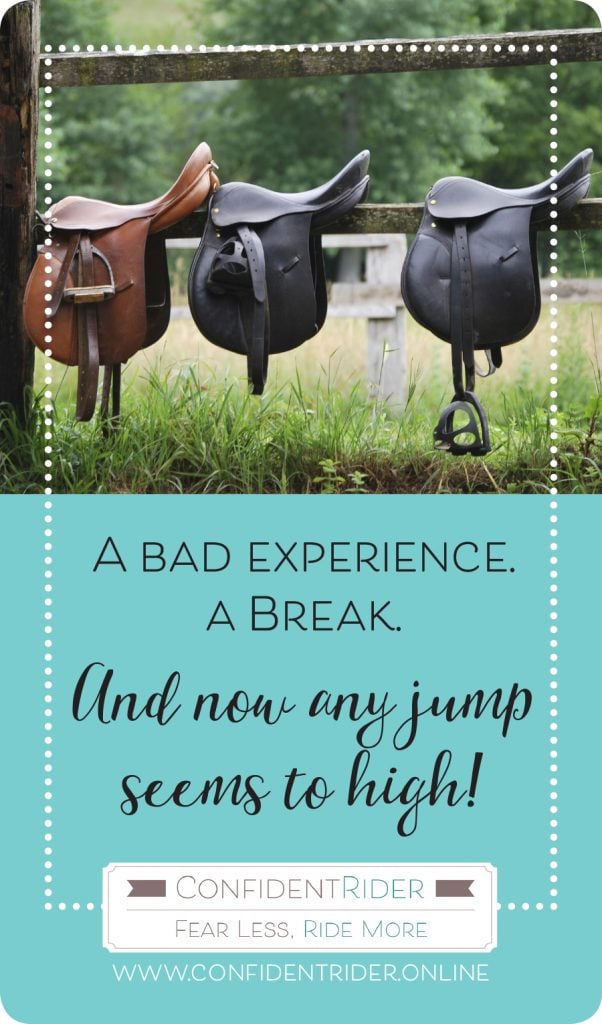
Julie wrote to me about a situation that I know is not at all uncommon; she had a series of “bad experiences” jumping, a bit of a break (in her case a few years) and now she is finding on her return that her mojo and jumping confidence has totally left the building. Gah!
Here’s what she has to say….
I’m wanting some help over coming my fear around jumping. I am an experienced rider and although never overly brave, I would happily jump around metre courses. However, I had a couple of bad experiences and a break from jumping (a few years) and when I have come back to it I find that even the tiniest fence is terrifying.
My thought process the whole time is what will go wrong, such as the horse will stop and I will go over its head rather than thinking about what will go right. As a result I avoid jumping. I really want to get back into it and to be competitive again. What can I do?
The situation that you are describing is not an uncommon one, although in saying that it doesn’t make it any less frustrating or upsetting. In regards to the bad experiences you describe, here’s a slightly different look at it which will help you make sense of how your mind has stored the experience…
Whenever we experience a strong emotional reaction that is linked to a specific event the two essentially become interlinked or anchored to each other. Our minds do this as a short cut mechanism to prevent us from repeating harmful or dangerous experiences unnecessarily. Regardless of the actual outcome of the experience, your mind has interpreted it as threatening to your emotional or physical security (it goes all homeland security on you), and simplistically speaking has stored the experience in the hard drive of your subconscious mind.
If you think of the mind like a computer, in order for us to access specific files, we need to provide the right triggers. In this case, jumping for you if the trigger for the file to be reopened, and as a consequence you experience a negative reaction- your mind is simply trying to prevent you reliving the same experience again. It has your best interest at heart! Given that you have had a significant period away from jumping and left on a “bad note”, your mind has had many opportunities to revisit the file and play the movie of your experience over and over again, reinforcing the emotions. The time lapse between has also ensured that no other experiences have been provided to challenge or undermine its validity.
There are three main objectives that I would like to work with here. The first is to reprogram your association with jumping from one that is negative, to one that associates it with pleasure and fun. Instead of thinking about what it is costing you, or how bad it feels to jump, I want you to switch it around and think about what it is costing you not to jump. Get as emotional as you can. We want to switch the “pain point” around. For example, not jumping might mean that you aren’t able to achieve the goals that you set out for yourself, that you rob yourself of an exciting and pleasurable experience with your horse. Think about everything you are going to miss out on by not jumping and give yourself some leverage.
The second is to create the future in advance. Sit down and write out your vision for your ideal jumping round or training session. You don’t have to think too far ahead- this might just involve you happily popping over a couple of small jumps in the arena. Introduce as many of the senses are possible. What do you see in your mind’s eye? What’s going on around you? How do you feel as you go over the jumps? What are you saying to yourself? What is your internal dialogue as you successfully complete the rounds? Once you have created a picture, live the scenario out in your imagination for a few minutes a day. Visualisation is one of the most powerful tools to affect subconscious change that we have at our disposal. Marinate in the vision you have created for yourself and begin to live a different jumping reality in your mind.
Finally, work to incrementally increase your comfort zone. Look to bank a series of successful rides that you mind can draw confidence and reassurance from. There is no height requirement; start off with poles on the ground if you need too! Remember, your current situation is not a determinant of your future reality; you are just looking to put the stepping-stones in place to build up to jumping bigger heights.
Think of the point you are at now as point 0 and where you want to be is point 100. Between these two points are a myriad of others; what points could you introduce that would allow you to gradually build up your jumping confidence? Recognise that feelings of discomfort will always be present when you are extending the parameters of your comfort zone; feelings of terror mean you have gone too far. Look to move forward only as far as you can easily step back. Over time, your comfort zone will begin to expand and your jumping confidence and capacity can only increase as a result.
I have no doubt with a few tweaks and turns, you will be back to rocking it out in the ring.
Best of luck!
xx Jane
Let’s talk jealousy…
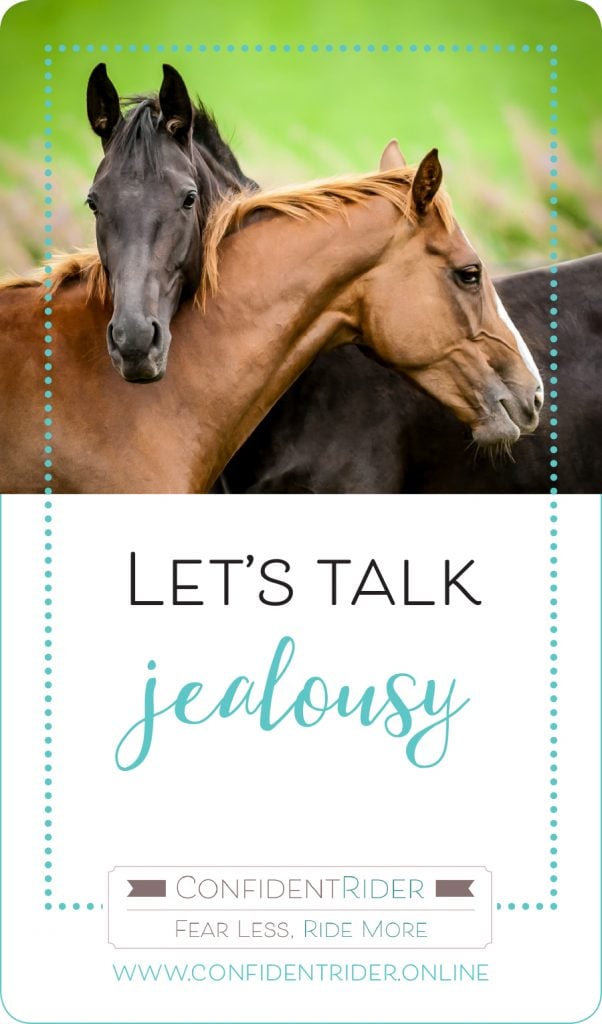
Let’s talk Jealousy…
Oh, the old green eyed monster! Unless you are some sort of highly ascended being who has never been caught in the wrath of a jealous moment (and in which case I want to meet you and give you a high five in person), most of us have experienced a jealous moment or two over the course of our lives. For the most part, jealousy is seen as something that needs to be trampled on and never mentioned again, and that may be so if the only course of action you plan to take is to let your jealousy fester and become a much larger force de vivre, such as bitterness, bad sportsmanship, or chronic grumpiness. Delightful right?
Like any emotion that we embody, jealousy is just another messenger that is vying for your attention in order to tell you something, and predominantly the message is that you have seen something that you want for yourself.
Someone has won an event that you would love to win
Someone is riding a horse that you would like to ride
Someone is making progress in training and you feel stuck in one spot
Someone has overcome their nerves and anxiety and you still feel unconfident and afraid.
It’s not about the other person. It’s about you. It’s about you wanting something for yourself that you perceive to be out of your reach or capacity to achieve in the present moment, and as a result you feel, well…. jealous. It’s horrible, frankly, and we have all been there, but the truth of the matter is, that staying there and marinating in your little pool of jealousy is not going to do anything to help you except make you feel worse. Nasty!
That being said, let’s have a look at some of the positive messages of jealousy and how you can use them to take the next best step forward.
1. Jealousy indicates you are ready for the next level, that you are open to some kind of transformation
If you see someone doing or having something that incites jealousy within you, reflect on your emotional reaction and ask yourself why you are feeling this way. What is it that you actually want? If it’s to win a certain award, feel or ride a certain way, or to achieve a certain level in training, don’t wallow, get busy. Or better still, get inspired!
That point that you are aspiring too marks your aspiration point. Fabulous! You have something concrete that you want to work towards. Now to work your way backwards! If this is where you are now, and that is where you want to be, what steps do you need to take in the meantime to bridge the gap between the two. And then decide on one step that you can take within the next 24 hours to set you on course toward your target.
2. The only behavior you can control is your own
The reality is, at the end of the day, the most likely person to be affected by your jealousy is you. There’s nothing wrong with feeling jealous for a moment (News Flash: You’re human!), but don’t let it define your future. Recognise it, evaluate it, thank it (it’s provided you with some good insights as to what you want), and then get on with DOING something to get towards where you want to be.
Envy and jealousy is boring really. Who wants to hang out with someone who blows smoke over the success of others but doesn’t do anything to change their own reality? Not me, that’s for sure. Yawn…
3. Learn to Celebrate other people’s successes
Here’s the thing: other people doing well doesn’t mean that you are failing. You are unique, your horse is unique, and frankly, the journey that you are on is yours and yours alone.
Celebrating other people’s success is an important emotional reminder that you not only think they THEY are worthy of the success, but you are also. After all, if you can’t see good in other people’s awesome moments, who’s to say that you will see good in your own?
See the achievements of others as an indication of what’s possible. There’s plenty of room at the top after all!
xx Jane
Survival Tips For Putting Yourself Out There
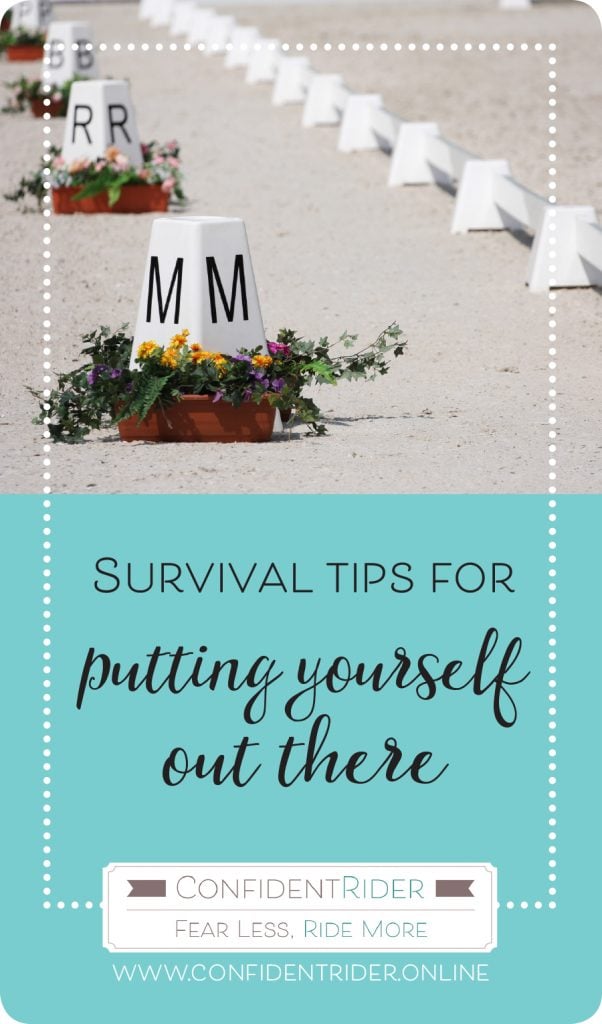
Survival Tips to Transcend the Moments When You are Going to Put Yourself out there and feel a little …. Stupid.
It’s a sad state of affairs when we limit ourselves and our capacity based on what other people are thinking. If you are hung up on the thoughts and opinions of others, or don’t put yourself out there at the risk of looking stupid, here are three of my top survival tips for setting that baggage aside and strutting your stuff like the equestrian version of Charlie’s Angels. Let’s hit it.
1. Remember your outcome
When we start feeling stupid and worrying about what everyone around us is doing, we forget why we are doing it in the first place. It distracts us from Mission: Awesome and instead turns it into Mission: Hot Mess. Know what you are doing there, why you are doing what you are doing and how it fits into your overall plan and future goals.
Anyone who achieved great things spent some time feeling like they didn’t know everything, like they couldn’t yet do what they wanted to do in the way that they wanted to do it, and yes, feeling a bit stupid. When you start to stretch the bubble of your comfort zone you are quite literally expanding your comfort zone. And when you start to expand your comfort zone, guess what? You feel uncomfortable! If you don’t feel uncomfortable, well… you are still inside your comfort zone.
Uncomfortable is ok. Your comfort zone will expand to meet you in time. But if you don’t move the perimeter posts, it’s never going to happen.
2. Remember, it’s temporary.
We need to reframe this for a second. You are far from stupid right now. What you actually are is a Neural Highway Ninja. Basically, all those neural networks in your body are connecting up new pathways, joining the dots together and building both your mental and physical muscles in ways that will allow you to get out there and repeat the same task much more ease-fully in the future. You getting out there and actually doing it- not thinking about it, talking about it, or drinking coffee about it- is the only way that you are going to make this happen. The only way.
Forget stupid. Your totally bad ass. B.A.D. A.S.S.
You heard me!
3. Work out your Inner Circle of Awesome.
In all likelihood, most people aren’t as obsessed with us as we are. Strange I know. If, however, you just can’t get past wondering what other people are thinking, then you need to get selective. Narrow it down.
In the Academy, I talk about the Inner Circle of Awesome. Your Inner Circle of Awesome is your crew, your posse, the group of people that know you, know your horse and know where it is that you are both heading. These are people who have your best interests at heart and whose opinion you can listen to. From their constructive feedback, you can pick out the jewels that will help you further your training and continue on.
Everyone not in your circle of awesome you can absolutely listen to, but they are essentially surplus to requirements. Appraise any feedback on its value mechanism. Can I use this information to improve the performance of me or my horse?
If yes, fabulous. Thank you and move on.
If not, fabulous. Thank you and move on.
Be clear on what you want, and take immediate steps towards actualizing it. If you are going to shine like a crazy diamond, you can’t hide under all the rocks in the pond. Get out there and do it! I’ve got your back.
xx Jane
Flexing Your Mental Muscles
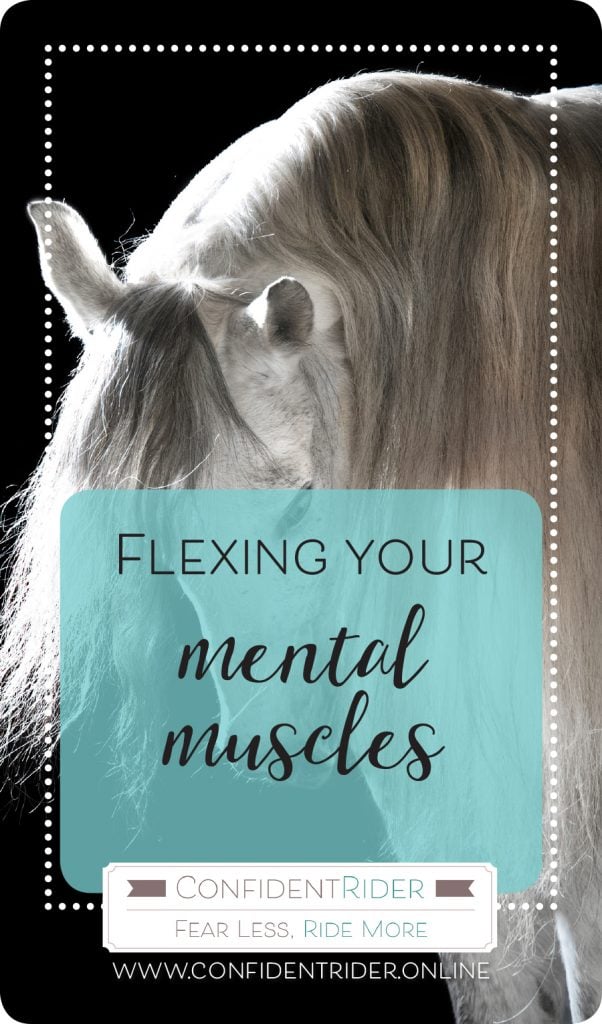
Jenny really has it going on. At the moment, she is pretty much at the top of her game. Pictures of Jenny pop up on your newsfeed and you can’t help but have a quick peek. You try not to give them too much thought, but I mean, what can you do?! They are right there!
She looks great of course. She’s riding the horse that everyone would like to have in their paddock or barn. Wow, he must be amazing to ride, you tell yourself. Imagine having a horse like that! She transports said horse in a top of the line, brand new truck. It’s so shiny it looks, almost unused. You mentally compute the cost of the truck and compare it to the cost of a house. For a little minute, you think that you may have actually swallowed your tongue. You need a glass of water.
Wow. Jenny looks phenomenal in a pair of breeches. Actually, it’s like breeches were crafted specificallywith Jenny in mind. It’s not normal. People shouldn’t look that good in stretch lycra, should they? No. It’s not normal.
When Jenny struts her stuff at competition, she seems to really have it together. Does she EVER lose her cool? You can see the whole package, the professional demeanor on the 15 second clip with the inspirational musical background she’s just uploaded to Instagram. Sickening and irresistible all at once. You try to turn it off, but instead watch it 5 times on repeat. You notice that you have wrinkled your nose slightly.
In her photos, Jenny always looks so happy. Actually, speaking of her photos, does she have a professional photographer follow her around? Is that her partner? Who looks like that when they are mucking out? You flick a piece of hay of your jodhpurs and consider whether it’s time to put them in the wash.
Many of us have a Jenny in our lives, or have come across a Jenny at one time or another. Some of us might be inspired. Wow, they might say. If she can do it, that means I can to! Let’s get out there and make it happen!
But equally as many will entertain feelings that are a little…. Uncomfortable. For instance, they might compare themselves to Jenny and in the process feel a little… less than. That’s not our fault though, they tell themselves, that’s Jenny’s fault! Splashing herself around like that!
And there might be a tiny background voice saying, Why aren’t I able to keep it together like she is? What’s wrong with me?
We may even host our own pity party. It’s not fair! If I had the money, I’d be able to do what she’s doing! If I could buy a horse like that / own a truck like that / get help like that. I’m just not that lucky! I could if….
Or it may be a bit more covert, a little more undercover. An eye roll. A sigh. A “uugh, not Jenny again! Spare me!”.
These reactions can seem… inconsequential. Insignificant. Justified even, at least in our own minds. But in reality, little moments, these little diversions into the negative, into comparison- they cost us something. They remove money from our mental bank and leave us with less to draw on. Ultimately, they are nibbling away at our mental strength.
Why? Well, let’s take a look. It’s not enough to try and cultivate positive habits and beliefs. We have to work at removing our negative habits also. Negative habits, no matter how small, how inconspicuous, or seemingly harmless, will hold you back. They divert your focus away from possibility to “lack”. They rob you of your power and steal your momentum.
Let’s look at the top 3 mental habits that take the glittery crown of our mojo’s without us even realizing.
1. Holding onto unhealthy or negative beliefs about ourselves
Even if you can’t isolate what negative belief patterns you are operating from, you can almost always recognize their effects. When we are acting from a belief foundation that is limiting us, we tend to feel stuck. Limited in our capacity, like there is a whole range of activities and experiences we would like to take part in, but we don’t believe them to be available to us. Oh, they can do that, but I can’t. I’m not a good enough rider to do that. I’m not as lucky as them.
More often than not, we magnify our misfortune in our minds and allow it to carry forward into our future. Instead of viewing a situation or challenge and temporary, we grant it a sense of permanency, and carry it forward into our future decision-making and outcomes.
When we are operating from this mindset, pity parties are a common occurrence. Sometimes we invite other people to join us- we gossip, look around us and bring other people down- or we party alone. It’s not fair! Why does this always happen to me!
We are problem focused instead of solution focused.
If you find yourself behaving in the way, ask yourself- what am I choosing to believe about myself in this moment? Is this belief moving me forward in the direction that I want? And if not, what do I need to believe in order to create the kinds of outcomes that I desire?
2. Shifting Responsibility
How we respond to any event or circumstance is a choice. We are always in control of our own feelings and our own responses to any given situation. This realization is the foundation stone of owning your own power. When I talk about power here, I don’t mean physical power; I mean the quiet confidence that comes with the realization that how you choose to behave is something that you have control over. It may be the one great freedom we are all blessed with, the ultimate equalizer.
Seek to develop a level of consciousness that allows you to respond to your environment as opposed to mindlessly react. You are in control. No one has the power to make you feel a certain way, or behave in a certain way unless you assign it to them.
3. Generalised, global beliefs
Global beliefs, as the name suggests, are more expansive. They rise to the surface when we take an entire group and assign a label to them all. An example of a global belief would be “Thoroughbreds are hot” or “Everyone who competes at a high level is wealthy”. Banal examples, but we take an entire group and we assign to them something specific. In doing this, we are actually diminishing our own capabilities, and operating from a fixed mindset.
Believing that all Thoroughbreds are hot, for instance, may cause you to pass up the opportunity to work with an amazing horse just based on your own biases of breeding.
Believing that everyone who competes at a high level may stop you putting in the required level of effort to compete at a high level yourself. After all, if you don’t currently have the funds, what’s the point? Your belief system will limit the decisions that you make, and as a result of those decisions, the actions that you take moving forward.
Whilst it may seem a little daunting to dig in and analyse what unhealthy belief systems are holding you back, you can’t really afford not to. We have to train our minds to think differently, and to move away from comparing ourselves to the person next to us.
So the next time “Jenny” pops up in your news feed, flash her a smile and send her a virtual high five. One person living their dreams is all the evidence you need that you can get out there and live yours too.
xx Jane
Cultivating Confidence
Earth to Planet Confidence? Can you hear me?
Confidence issues. They are the Captain KillJoy to our Super Hero selves. You don’t have to be a psychology expert to know that confidence- or a lack of it- affects every aspect of our lives, and obviously has a huge affect on how we conduct ourselves in the saddle. I thought in this particular post we could go all Keanu Reeves (I’ll probably bust out some sweet moves as I’m writing), dive into the matrix and have a good poke around inside the workings of our mind and how we can use it to our best advantage when cultivating confidence.
Ready? Excellent. Let’s get in there.
Now you have entered the inner workings of your brain space, you will notice that it is operating in two distinct parts. You may not have seen them before from this exact angle, but you will recognize them when I tell you that they are the conscious and the unconscious (or subconscious) mind. I know it’s a surprise to realise that the conscious mind is actually really small. You don’t have to worry- this is not an indicator of your intelligence- it’s just that the conscious mind actually only occupies a very small part of the overall mind-scape, even if it is the area that we are the most familiar with. If you imagine for a moment that you are floating on a canoe on a lake, the canoe would represent the conscious mind, and the lake your unconscious mind. It’s important (obviously) but it’s only a tiny slither of what’s around us (or inside us, as the case may be).
Anyway, back to the mind. Your conscious mind is communication headquarters. It sends out to the world everything that you wish to communicate, and also controls your inner dialogue, the little voice inside your head that speaks to you. It’s Captain Communicator, sending out into the universe everything that the unconscious mind commands.
If you would step into your unconscious mind, you would notice it to be a huge storehouse of all your memories and experiences. Everything that you see in here is malleable- it can be extracted, molded and shaped in a thousand different ways, but the shapes that they form for us join hands with Captain Communicator and come out on the other side as our habits, behaviors and beliefs. It uses all of the information that it has stored to make sense of all the incoming data that you receive from the world, with its primary job being to keep you safe and ensure your survival.
You will also notice that between the unconscious and conscious minds there is a filter. This filter is made up of two layers; your belief systems and your focus. Your belief systems and your focus are hard at work picking through the storehouse of past memories and experiences and then using them to give meaning to your present circumstance. This filter system is the most powerful mechanism you have at your disposal to determine your reality. Essentially, whatever you choose to focus on, you give meaning too, and as soon as you assign meaning, you assign power. Your consequent experience only becomes positive or negative as a direct result of your focus, which has the power to lift you up and propel you forward, or bring you down.
If you have shaped your identity or associate strongly to the idea that you are an unconfident rider- you might believe that you aren’t good enough, or that you don’t have what it takes- then this belief will inform your focus. Our minds always seek to make our external reality congruent with our internal world. It wants them to match up. Consequently, if you believe that you aren’t good enough, your filter system begin to search through all of the resources of your unconscious mind to support your assertion and presents them to the conscious mind in defense of your case.
Your focus will rally to support the cause also. Believe you aren’t good enough? *** rubs hands together *** let’s see what meaning we can attach to all our your present and future experiences show you how true this is! A training rider that didn’t go to plan then becomes a reflection of your inability as a rider, a personal blight as opposed to something that is able to be worked through and constructively used to your advantage. After all, seeing things differently or focusing on a different possibility would go against your belief system, and the mind most certainly doesn’t want that. We want the inside and outside to match remember!
Think about it in terms of your own experience; if you are a rider who identifies with having confidence issues, do you sway towards being positive or negative, pessimistic or optimistic when it comes to assessing your riding and your future possibilities?
The ability of your conscious mind to direct attention and awareness is one of your ultimate super-powers. In order to create confidence, you must learn to control what it is that you are focusing on, and the actual skill of directing your focus comes down to reprogramming your belief systems and a single, ongoing decision to control your focus; deciding how and what you will think and consciously directing your thoughts in a way that creates positive meaning, action and momentum.
Becoming confident riders starts at this point- by recognizing the belief systems that limit us and understanding the ways that we allow them to inform our focus, and consequently, our reality. The key to the Confidence Vault comes with your ability to attach an empowering meaning to any given situation and adopt a new belief. No belief need be permanent. They are self-created entities- the only power they hold is the power that we assign them.
xx Jane

